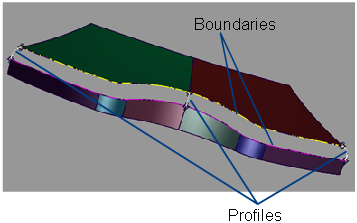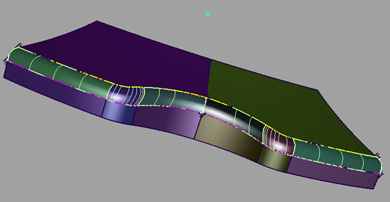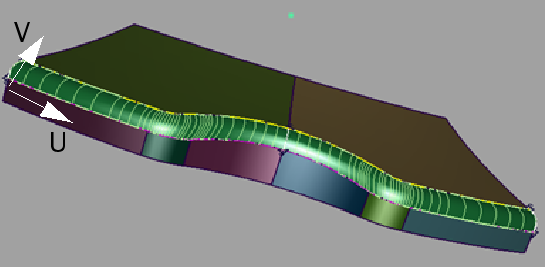Show in Contents

Add to Favorites

Home: Alias Help

Manipulate fillet surface cross section and continuity

Build transition (secondary) surfaces

Create rolled edge surfaces

Create a blend surface by
specifying profiles
How
to create one or many transitional surface(s) between multiple continuous
surface boundaries, by specifying any number of cross-sections (profile
curves) between the primary surfaces.
The primary surfaces’
edges may be trimmed, untrimmed, curves on surface, or isoparms.
You can place any number
of profile curves (cross-sections) at any point between the primary
surfaces’ boundaries. Profiles can be any type of curves, including
blend curves and surface boundaries.
- Choose Surfaces > Multi-Surface Blend > Profile Blend
 ❒ to open the option window.
❒ to open the option window.
- Select all the surface boundary curves.
The first set of boundaries
is highlighted in purple, and the second set of boundaries is highlighted
in yellow.
NoteIf Chain Pick is
turned on in the option window, selecting the boundary of one surface
will also select all other boundaries that are tangent continuous
with it.
- Press the Go button.
- Select all the profile curves that will
define the transitional surface.
The selected profile curves are highlighted
in white.
After you select the first profile curve, a Recalc button
appears.
- Press the Recalc button
when you’re finished selecting the profile curves.
Blend surfaces are built between the primary
surfaces.
- Set Surface
Type to SINGLE SURFACE in the option
window, and click Recalc to compute a single
blend surface if desired.
- Modify other parameters in the option
window if necessary, then click Recalc to rebuild
the surface (or turn on Auto Recalc. in
the option window for the recalculation to happen automatically).
- Add or delete input curves by clicking
on them, to further refine the transitional surface.
NoteSince the input curves
have construction history, modifying them also updates the transitional
surfaces.
- Turn on Continuity Check in
the option box to evaluate the continuity of the blend surface with
the primary input surfaces. See the section Troubleshooting trimmed surfaces for
more information.
 ❒ to open the option window.
❒ to open the option window.


